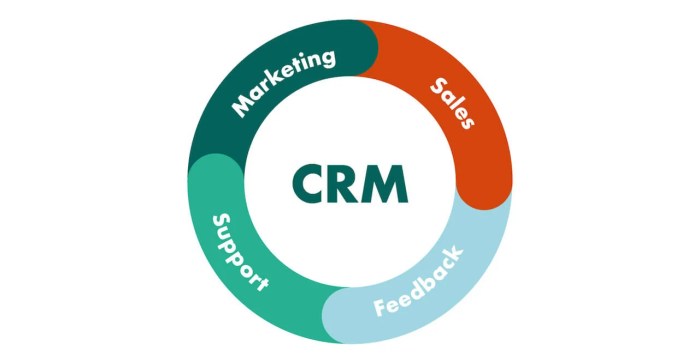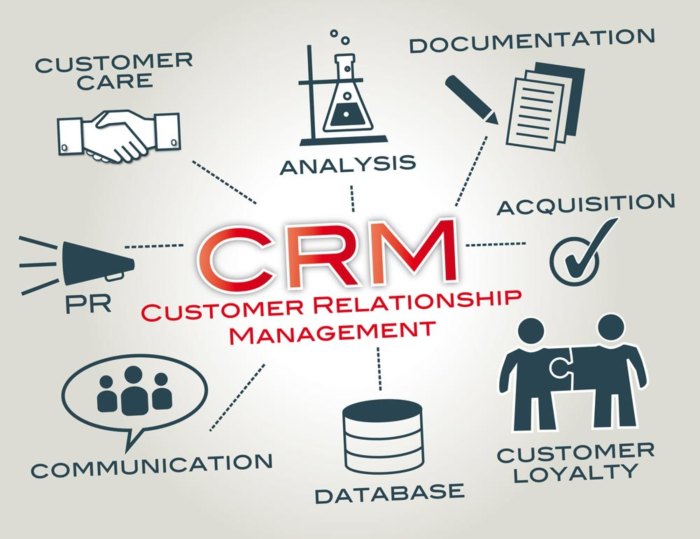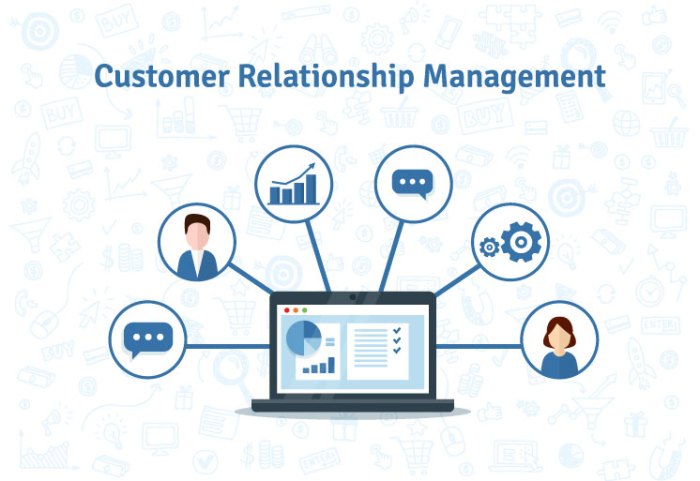In the competitive world of small business, maintaining strong client relationships is crucial for success. Client relationship management (CRM) software has emerged as a powerful tool to help small businesses streamline their operations, enhance customer satisfaction, and boost revenue. This comprehensive guide will delve into the world of CRM software, providing you with everything you need to know to select, implement, and utilize this essential technology for your small business.
CRM software goes beyond simply storing contact information. It offers a centralized platform to manage all aspects of customer interactions, from lead generation and sales pipeline tracking to customer support and marketing campaigns. By leveraging the capabilities of CRM systems, small businesses can gain a deeper understanding of their customers, personalize their interactions, and foster long-lasting relationships.
CRM Software Overview
Customer relationship management (CRM) software is a powerful tool that can help small businesses manage their customer interactions, track sales leads, and improve customer service. By centralizing customer data and automating tasks, CRM software can help businesses save time, increase efficiency, and grow their business.
Key features of CRM systems include:
- Contact management: Store and track customer contact information, including name, email, phone number, and address.
- Sales pipeline management: Track the progress of sales leads through the sales process.
- Marketing automation: Automate marketing tasks, such as sending emails, creating social media posts, and tracking website traffic.
- Customer service management: Track and resolve customer support requests.
Some popular CRM software solutions for small businesses include:
- Salesforce
- HubSpot
- Zoho CRM
- Freshsales
CRM Software Selection

Selecting the right CRM software for a small business is crucial for effective customer relationship management. Here are some key factors to consider:
Cost: Determine the budget for the software and consider ongoing costs such as maintenance and upgrades.
Features: Identify the essential features required for your business, such as contact management, sales tracking, and marketing automation.
Ease of Use: Choose software that is user-friendly and intuitive for your team to adopt quickly and efficiently.
Scalability: Consider the potential for growth and ensure the software can scale as your business expands.
Integration: Determine if the CRM software integrates with other business applications you use, such as accounting or email marketing.
Support: Evaluate the level of support offered by the vendor, including documentation, training, and technical assistance.
Step-by-Step Guide to Evaluating and Comparing CRM Solutions
- Define your requirements: Determine the specific needs of your business and the features that are essential.
- Research options: Explore different CRM solutions available in the market and compare their features, pricing, and support.
- Request demos: Contact vendors for demos to experience the software firsthand and ask questions.
- Get feedback: Ask for references from existing customers or read online reviews to gather insights about the software’s performance.
- Make a decision: Based on your evaluation, select the CRM software that best meets your requirements and aligns with your budget.
Tips on Choosing the Right CRM Software for Specific Business Needs
- For startups: Focus on affordable, easy-to-use solutions with essential features.
- For small businesses: Choose software that offers scalability, integration options, and tailored support.
- For growing businesses: Consider CRM solutions that provide advanced features, customization options, and robust analytics.
CRM Software Implementation

CRM software implementation in a small business requires a structured approach to ensure successful adoption and effective utilization. Best practices include involving key stakeholders, defining clear objectives, and establishing a comprehensive implementation plan.
CRM implementation presents challenges, such as data migration, user adoption, and ongoing maintenance. However, it also offers opportunities to streamline processes, improve customer relationships, and enhance data-driven decision-making.
Steps for Successful CRM Implementation
- Plan and Define Objectives: Establish clear goals and objectives for the CRM implementation, aligning it with the overall business strategy.
- Involve Key Stakeholders: Engage relevant departments, including sales, marketing, and customer service, to gather input and ensure buy-in.
- Select and Configure Software: Choose a CRM solution that meets the specific needs of the business and configure it to align with existing workflows.
- Data Migration and Integration: Import existing customer data and integrate the CRM with other business systems to ensure data consistency.
- User Training and Adoption: Provide comprehensive training and support to users to ensure they understand the CRM’s functionality and can leverage its benefits.
- Monitor and Evaluate: Track key metrics and gather feedback to assess the effectiveness of the CRM implementation and make necessary adjustments.
CRM Software Utilization
CRM software is a powerful tool that can help small businesses manage customer relationships effectively. By centralizing customer data, tracking interactions, and automating tasks, CRM software can help businesses improve customer satisfaction, increase sales, and streamline operations.In this section, we will discuss how to use CRM software to manage customer relationships effectively.
We will provide examples of real-world use cases and success stories, and share tips on maximizing the value of CRM software for small businesses.
Real-World Use Cases
CRM software can be used in a variety of ways to manage customer relationships. Here are a few examples:
- A small business can use CRM software to track customer interactions, such as phone calls, emails, and meetings.
- A sales team can use CRM software to manage their sales pipeline and track customer progress through the sales cycle.
- A customer service team can use CRM software to track customer issues and resolve them quickly and efficiently.
Success Stories
There are many success stories of small businesses that have used CRM software to improve their customer relationships. Here is one example:
“We used to have a very manual process for managing our customer relationships. We would track customer interactions in a spreadsheet, and it was very difficult to keep track of everything. Since we implemented CRM software, we have been able to streamline our operations and improve our customer service.
We now have a single view of all of our customer interactions, and we can track customer progress through the sales cycle much more easily.”
Small business owner
Tips for Maximizing Value
Here are a few tips on maximizing the value of CRM software for small businesses:
- Choose the right CRM software for your business. There are many different CRM software solutions available, so it is important to choose one that is right for your business’s size, industry, and needs.
- Implement CRM software correctly. It is important to implement CRM software correctly in order to get the most value from it. This includes setting up the software properly, training your staff on how to use it, and integrating it with your other business systems.
- Use CRM software consistently. In order to get the most value from CRM software, it is important to use it consistently. This means logging all customer interactions in the software, tracking customer progress through the sales cycle, and using the software to generate reports and insights.
CRM Software Integration
Integrating CRM software with other business systems is crucial for small businesses to streamline operations, improve efficiency, and gain a competitive edge.CRM integration enables the seamless flow of data between different systems, eliminating the need for manual data entry and reducing the risk of errors.
It provides a centralized platform for managing customer interactions, sales pipelines, and marketing campaigns, while also allowing businesses to track key metrics and generate valuable insights.
Benefits of CRM Integration
- Improved data accuracy and consistency: Eliminates manual data entry and ensures that data is updated in real-time across all systems.
- Increased efficiency: Automates processes, reduces workload, and frees up time for more strategic tasks.
- Enhanced customer experience: Provides a complete view of customer interactions, allowing businesses to personalize communication and deliver exceptional service.
- Improved decision-making: Provides access to real-time data and analytics, enabling businesses to make informed decisions based on accurate information.
Challenges of CRM Integration
- Data security concerns: Integrating systems can create new entry points for security breaches, requiring careful planning and implementation.
- Complexity of integration: The technical process of integrating different systems can be complex and time-consuming, requiring expertise and resources.
- Cost of integration: Integration can involve significant costs, including software licensing, implementation, and ongoing maintenance.
Recommended Integrations for Small Businesses
| Integration Type | Benefits |
|---|---|
| Email marketing: | Automates email campaigns, tracks customer engagement, and provides insights into email performance. |
| Accounting software: | Synchronizes customer invoices, payments, and other financial data with CRM. |
| E-commerce platforms: | Connects CRM with online stores, enabling businesses to track customer orders, preferences, and purchase history. |
| Social media management tools: | Integrates social media channels with CRM, allowing businesses to monitor customer interactions and respond promptly. |
CRM Software Trends

CRM software for small businesses is constantly evolving, with new trends and advancements emerging all the time. These trends are driven by the changing needs of small businesses, as well as the rapid pace of technological innovation.
One of the most significant trends in CRM software is the increasing use of artificial intelligence (AI). AI can be used to automate a variety of tasks, such as data entry, lead scoring, and customer service. This can free up small businesses to focus on more strategic tasks, such as growing their business and developing new products and services.
Another major trend is the increasing adoption of cloud computing. Cloud computing allows small businesses to access CRM software without having to invest in expensive hardware and software. This can make CRM software more affordable and accessible for small businesses.
Impact of AI, Automation, and Cloud Computing on CRM
- AI can be used to automate a variety of tasks, such as data entry, lead scoring, and customer service.
- Cloud computing allows small businesses to access CRM software without having to invest in expensive hardware and software.
- The combination of AI and cloud computing is making CRM software more affordable and accessible for small businesses.
Future of CRM Software for Small Businesses
The future of CRM software for small businesses is bright. As AI and cloud computing continue to develop, CRM software will become even more powerful and affordable. This will make it even easier for small businesses to manage their customer relationships and grow their business.
Final Conclusion
Embracing CRM software is not merely an investment in technology; it is an investment in the future of your small business. By empowering you with the tools to nurture customer relationships, CRM software sets the foundation for sustainable growth and profitability.
Remember, the key to CRM success lies in understanding your business needs, selecting the right solution, and maximizing its potential. With the guidance provided in this guide, you can harness the power of CRM software to transform your customer relationships and propel your small business to new heights.

